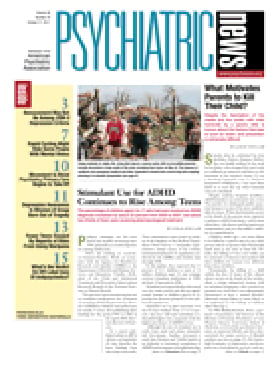Illinois residents with mental illness, including substance abuse disorders, now have greater access to mental health care under a new set of laws enacted August 18.
Among the new measures is a mental health parity law that exceeds the requirements of the federal Mental Health Parity and Addiction Equity Act.
"In Illinois, parity is mandatory, not voluntary, in that employers with 50 or more employees must provide mental health benefits, whereas the federal parity law states that coverage must be equitable only if employers provide mental health benefits," said Illinois Psychiatric Society (IPS) Executive Director Meryl Sosa.
Kenneth Busch, M.D., chair of IPS's Governmental Affairs Committee, thanked Gov. Pat Quinn (D) for signing the new bills into law and praised Sosa for drafting parts of the Illinois mental health parity legislation and working with a coalition of supporters to ensure the bill's passage through the state legislature.
The parity law was made effective immediately upon the bill signing, as was a measure creating a statewide Mental Health Services Strategic Planning Task Force and a law establishing community health advisory committees for counties and townships without existing community health boards. Following is a brief summary of the legislation.
House Bill 1530: The state's mental health parity act guarantees equitable insurance coverage and prevents insurers from instituting barriers to treatment for mental illness and substance abuse, including financial requirements, treatment limitations, and annual or lifetime limits, different from those they impose on other types of medical care.
House Bill 2084: The task force established by this law is charged with developing a five-year comprehensive plan for state mental health services. The plan will focus on issues such as reducing regulatory redundancy, improving access to and quality of care, and ensuring availability of hospital and institutional care for people with mental illness.
House Bill 2982: This measure creates "regional integrated behavioral health networks" to ensure and improve access to mental health and substance abuse treatment options through a coordinated approach to service delivery, particularly in the state's rural areas.
Senate Bill 1584: This amendment of the state's Community Mental Health Act requires counties of fewer than 3 million people and county-located townships of more than 3 million to appoint health-advisory committees comprising members of the general public in the absence of pre-established community health boards.
House Bill 1317: This law permanently excuses from jury duty those deemed unqualified to serve due to a permanent disability, including serious behavioral and mental disorders.
Senate Bill 1837: Under this measure, the mental health court established in 2006 in Kane County, Ill., may work with accredited mental health service providers to deliver services to defendants. The court is also required to report on its effectiveness in reducing the number of individuals with mental illness who enter the state's correctional system.
House Bills 2982 and 1317 and Senate Bill 1837 take effect January 1, 2012. The text of each bill is posted on the Illinois General Assembly Web site at <www.ilga.gov/legislation/default.asp>. 
